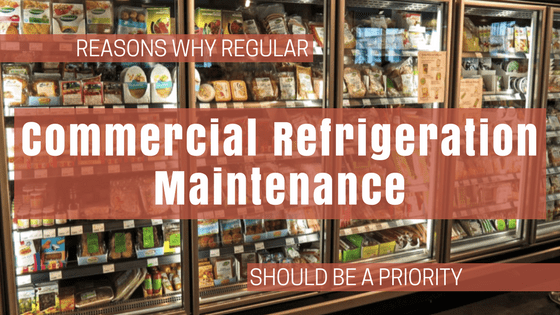In food processing and foodservice industries, having reliable and efficient commercial refrigeration systems is absolutely critical. That’s because the quality and safety of food products depend on the proper operation of refrigeration equipment.
One way to ensure that your refrigeration system is doing its job is to implement a regular maintenance program. Here is a look at the reasons why routine maintenance shouldn’t only be a priority, but also represents a much better alternative than reactive maintenance.
Fewer Unexpected Repairs
Improper, insufficient or total lack of maintenance can lead to serious deterioration and premature failure in refrigeration systems. To prevent sudden and unforeseen malfunction of critical components, such as the compressor, it’s essential to have your refrigeration equipment inspected and cleaned on a regular basis.
To properly maintain a refrigeration system, professional technicians perform a series of tasks, such as:
- checking refrigerant and oil levels;
- properly inspecting and lubricating condenser and evaporator fan motors;
- monitoring refrigeration system performance to minimize temperature and cycling losses;
- checking filters, ducts, refrigerant line insulation, electrical components, wiring, and connections;
- cleaning condenser coils, fan blades, drain lines and pans;
- monitoring the operation of the control system, including thermometer settings, defrost controls, safety controls, and pressure controls;
- checking refrigerator doors for proper seal, cleaning gaskets, and lubricating hinges;
- flushing acid descaling solution through the water circuit;
- replacing defective components.
Efficient Operation and Extended Equipment Life Span
In a nutshell, lack of adequate preventive maintenance can lead to a wide range of problems that will eventually contribute to the inefficient operation of refrigeration equipment. For instance, dirty fan blades, clogged filters, dirty condenser coil and/or ice accumulation on the evaporator coil can force the compressor to work harder and run longer between cycles in order to properly cool refrigeration compartments.
The constant overextension of the compressor will ultimately lead to premature wear and tear, potential system faults and failure that can cause disruptions to business operations. Additionally, a major breakdown occurring at the most inopportune times, such as at night or during weekends, could result in costly repairs and spoilage losses.
Since the energy costs associated with commercial refrigeration can make up a large portion of a company’s overhead expenses, maintaining commercial refrigeration systems regularly allows business professionals to conserve energy and save a lot of money in the long run.
Another essential aspect relating to routine commercial refrigeration maintenance is that it can help you improve safety by reducing the risk of slips and falls due to water leaks.
Planned Maintenance Visits and Priority Repair Service
As the owner or manager of a commercial or industrial facility, you can easily forget about maintenance visits. One of the advantages of opting for a preventive refrigeration maintenance program is that you don’t have to worry about keeping track of maintenance operations.
Besides pre-planning maintenance activities at optimal times so the downtime won’t affect your daily operations, a professional will be able to create a customized preventive maintenance plan for your refrigeration system requirements. Many refrigeration service providers also offer priority repair service as part of their refrigeration maintenance programs.
The success or failure of a company operating in the food processing, food preparation or foodservice industry largely depends on the quality of the food products it provides. The only way to ensure that your refrigeration equipment always operates at peak performance and provides the optimal storage temperatures for different perishable food items is to work closely with a professional service provider. Only a team of fully licensed and qualified technicians can help you develop the right preventive maintenance plan for your facility to help you prevent compressor failure.












